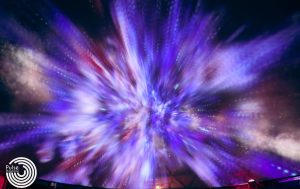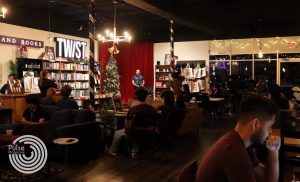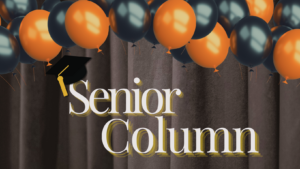From a honeycomb cell to a community beehive
EDINBURG, Texas—Since Oct. 18, University of Texas Rio Grande Valley community members could decorate and leave a honeycomb cell as part of an interactive community art exhibit in the Student Union on the Edinburg campus.
The individual honeycombs come together to form a beehive.
Jacqueline Reed, a psychology senior, came up with “BEELonging,” the interactive art exhibit, for the UTRGV Expressive Arts minor program. Reed had been inspired to facilitate an art exercise on campus after missing collaborative art during the pandemic.
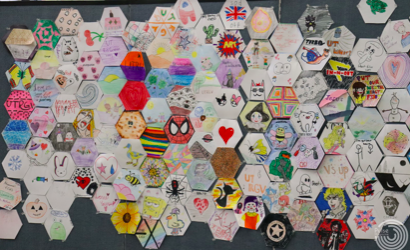
Last spring, Reed approached Kim Nguyen-Finn, coordinator of the Expressive Arts Program, about the idea, and Nguyen-Finn thought the project could be done following safety restrictions.
“We just worked together to design some type of art activity that students could do on their own, but it would visually be represented together so that when students put up their own personal artwork, they could see how it connects with the people around them, even when you feel isolated,” Reed said. “You’re still connected was kind of a concept.”
The UTRGV Office for Advocacy and Violence Prevention (OAVP) is a cosponsor of the exhibit. OAVP offered its partition walls so the honeycomb cells could be easily pinned.
In the Student Union, students could pick up individual art kits for their honeycomb cells.
“We also wanted it so that if folks wanted to take a bag and a kit, they could take a kit, bring it back and then put it up on the wall,” Nguyen-Finn said. “They didn’t have to sit there and do it if they didn’t want to.”
Over 100 honeycomb cells decorated, which Reed had not imagined.
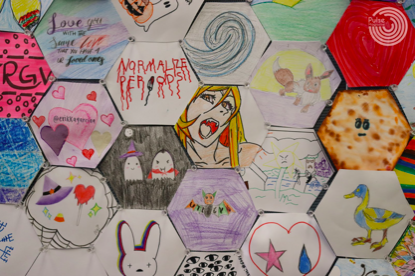
“It’s really exceeded my expectations,” she said. “I thought, ‘Maybe, like, a few people would want to join in,’ but I saw that there were moments where there were maybe even multiple people doing their squares at once. And I just thought it was really great to see people so interested in collaborating on it.”
When viewing the exhibit as a collective, one can see how the community shares similar experiences, Reed said.
“Looking at the exhibit as a whole, I felt really moved by seeing people’s individual pain or joy and how it would connect to the beehive honeycombs around them,” the senior said. “When you step back and look at it as a whole, you see this collective experience, like we’re all going through these themes together, even when they feel really personal.”
Nguyen-Finn, who is also a lecturer for the School of Rehabilitation Services and Counseling, said she has enjoyed seeing the campus community respond well to the exhibit.
“I’ve actually loved the results,” she said. “I’ve totally enjoyed going out there and seeing what the students are doing and what they’re putting up. It’s just been a joy to me, and I love seeing students back on campus together in groups.”
Nguyen-Finn said the exhibit will be moved later today to the Health Affairs West Building and stay there for at least another week.


